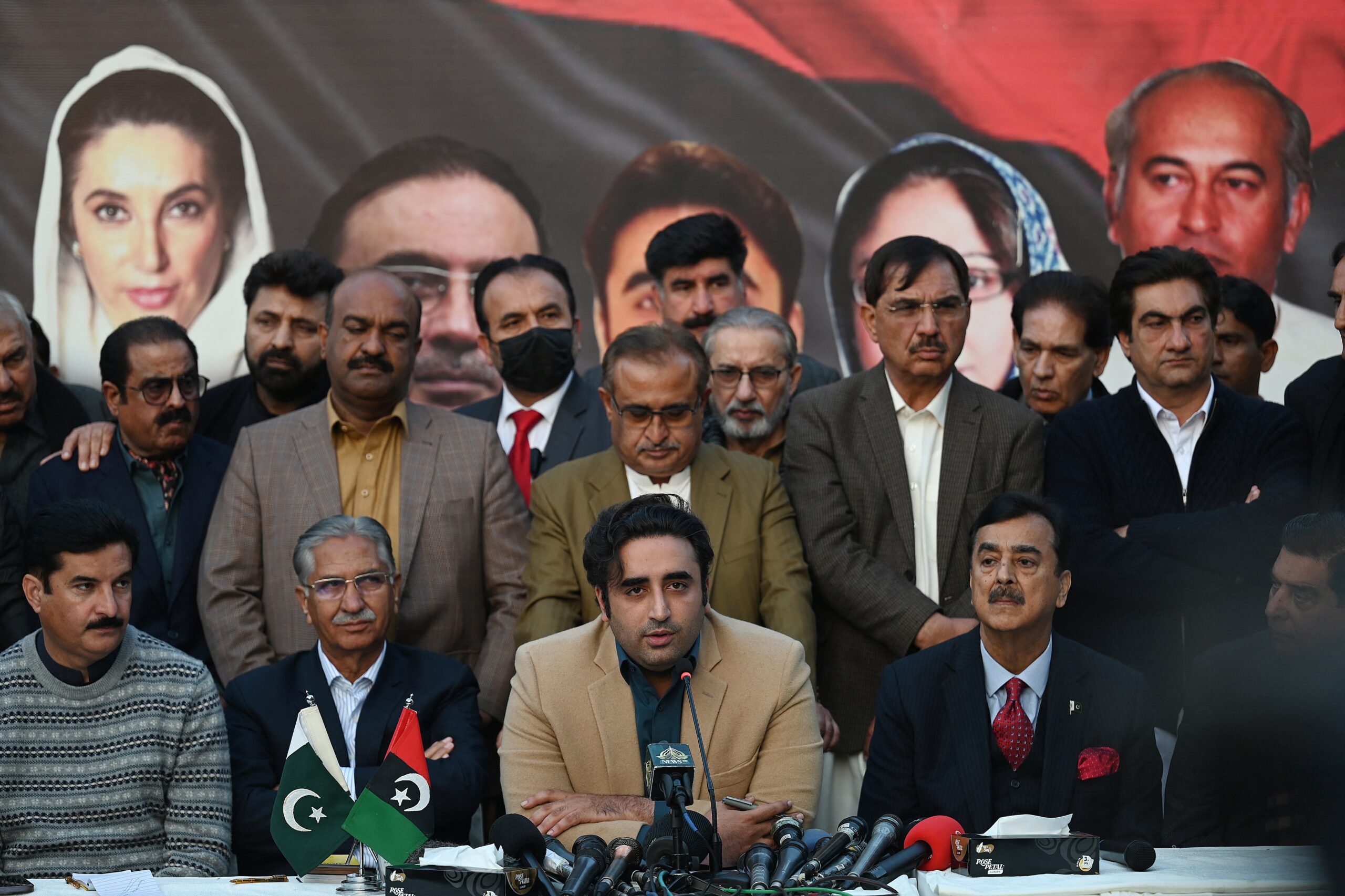Pakistan Peoples Party Chairman Bilawal Bhutto-Zardari has revealed that he said “No” to a power-sharing formula in which the prime minister’s post would be shared between his and former premier Nawaz Sharif’s parties, as he did not want to take up the top post without the people’s mandate.
The 35-year-old former foreign minister was the prime ministerial face of the PPP. However, in the February 8 elections, his party came third with 54 seats in the National Assembly, behind more than 90 seats won by independents backed by jailed prime minister Imran Khan’s Pakistan Tehreek-e-Insaf and Nawaz Sharif’s Pakistan Muslim League-Nawaz (PML-N).
To form a government, a party must win 133 seats out of 265 contested seats in the 266-member National Assembly.
The PPP and PML-N, who have formed a post-poll alliance, have failed to reach a consensus on a power-sharing formula despite several meetings between their top leadership.
Addressing a Yaum-i-Tashakur (Thanksgiving Day) rally in Thatta to celebrate the PPP’s election victory in Sindh province, Bilawal said, “I was told [by PML-N] that let us be the prime minister for three years and then you can take the premiership for the remaining two years.” “I said no to this. I said I do not want to be a prime minister like this,” he said. “If I become the prime minister, it would be after the people of Pakistan elect me.” Without taking any names, Bilawal said the party had decided that it would move forward with “those who have asked for its votes” and would not seek any ministries.
Bilawal also said his father Asif Ali Zardari would be the PPP’s candidate for president, insisting that the former president would play his role to defuse political tension.
“To control the fire spreading in the country, we have decided that Zardari will be our candidate for the presidential election. And when he takes up the post, he will put out this fire, and will save the Centre and the provinces,” he said.
He said the country needed a political party that talked about people’s problems, adding that the brewing economic and political crisis had divided society.
“What should happen is that politicians and all political parties should think about the people of this country instead of focusing on their personal benefit,” Bilawal stressed.
He claimed that a PTI-backed candidate was made to win against a PPP leader.
He said the PPP had decided to collect the election complaints of party workers from all over the country and raise them at appropriate forums. “If we are unsuccessful, we will come to you and protest together,” he said.
Bilawal appealed to all the political parties to “stay within the system” and work for the country’s betterment.
Reacting to Bilawal’s comments, PML-N leader Ishaq Dar stressed that it was not appropriate to divulge details about talks between the parties vying to form the next government.
He insisted that the PPP chairman had made the time-sharing formula public but “that was just one aspect and there can be more formulas”.
Dar said the plan to form a government with the PPP and Muttahida Qaumi Movement – Pakistan (MQM-P) was “still on” as he pointed out that there was no other choice available to them.
The former finance minister said the committees of both political parties had held four rounds of meetings so far but nothing was finalised as yet.
“None of the committee members of both parties will make anything public till it isn’t final,” Dar said.
“I receive calls daily to find out about the progress but I am morally bound to not say anything till it’s finalised,” he said.
He said that the upcoming meeting, marking the fifth round between the two parties, could lead to a breakthrough, although he refrained from divulging specifics.
“Consultation on various proposals was underway till yesterday,” Dar stated in a post shared by PML-N on X, suggesting ongoing deliberations between the parties. He further remarked that while progress had been made, both sides had yet to finalise key points of agreement.
“We are working towards consensus on critical issues,” Dar affirmed, underlining the parties’ efforts to forge a joint declaration regarding the composition of the next government at the federal level.
The elections have already been controversial with several serious allegations of widespread rigging to change results.
Imran Khan and his party have rejected the results claiming they had won at least 180 seats in the National Assembly and have called for peaceful protests throughout the country.
In the Balochistan province, several political parties have completely rejected the election results and have launched an indefinite shutter down, wheel jam campaign and also disrupted the traffic movement on the national highways.
Meanwhile, the PTI on Sunday renewed its efforts to form governments in the Centre, Punjab, and Khyber Pakhtunkhwa with the help of a new partner, the Sunni Ittehad Council (SIC).
It comes two days after its decision to sit on the opposition benches and launch a countrywide campaign against alleged rigging in the Feb 8 elections, In Khyber Pakhtunkhwa, the talks between the PTI Parliamentarians stalled after the PTI leadership demanded the removal of certain leaders, including ex-CMs Pervez Khattak and Mahmood Khan from the party.
However, during a press conference on Sunday, PTI leaders vowed to form governments, with its prime minister slot candidate Omar Ayub saying that 30 million votes were polled for PTI-backed candidates even without its electoral symbol of ‘bat’.
To boost its numbers in parliament, the PTI after talks in Islamabad decided in principle to become partners with the Sunni Ittehad Council (SIC) in the National and Punjab assemblies to claim seats reserved for women and minorities.
(This story has not been edited by NDTV staff and is auto-generated from a syndicated feed.)
![]()
